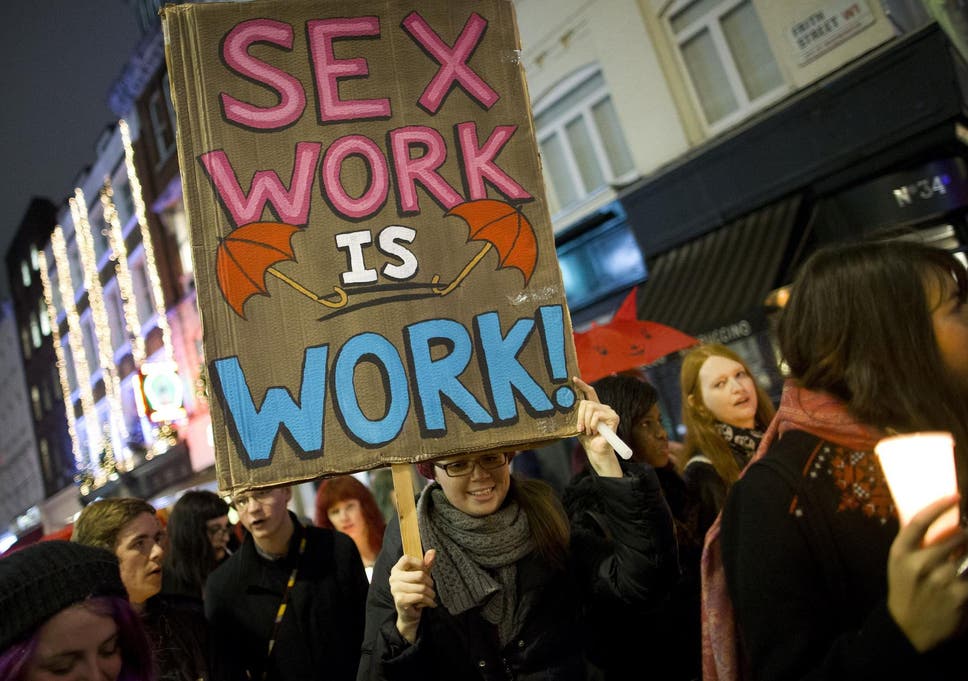Independent: More British people support sex-work law reform than are against it, study finds
English Collective of Prostitutes Latest News, Media coverage Decriminalisation
Exclusive: ‘People are horrified that sex workers suffer so much violence and understand that the prostitution laws, which force women to work in isolation, increase the danger of attack,’ says campaigner
Maya Oppenheim Women’s Correspondent @mayaoppenheim

Campaigners have called for sex work to be decriminalised as a new study finds more people in Britain support sex work law reform than oppose it.
It is not illegal for individuals to buy or sell sex from each other in the UK but soliciting and sex workers banding together as a group are illegal.
A study by human rights charity RightsInfo found 49 per cent of British people are in favour of decriminalising brothel-keeping – an offence punishable by up to seven years in prison.
The poll of 2,000 people, which is the first survey to be conducted on sex-work decriminalisation in four years, found 44 per cent think sex workers should not face prosecution for street solicitation – which amounts to offering their services in public.
They can presently be fined up to £500 for a first-time offence. The study is the first to gauge the public’s attitudes towards brothels separately from street prostitution.
Niki Adams, a spokesperson for the English Collective of Prostitutes(ECP), a leading campaign group which supports the decriminalisation of prostitution, said: “This poll confirms our experience that the public supports decriminalisation.
“People are horrified that sex workers suffer so much violence and understand that the prostitution laws, which force women to work in isolation, increase the danger of attack. Politicians need to catch up with the public and decriminalise sex work as well as overturning the government’s savage austerity cuts, which have left many women, and single mothers in particular, with few other options to survive.”
The ECP has long campaigned for decriminalisation – warning sex workers often have to choose between keeping safe and possible arrest, or avoiding a criminal record and putting themselves in danger.
Around a fifth of those surveyed in the research were found to be opposed to relaxing police enforcement on brothels and 27 per cent are against ending penalties for street solicitation. The poll found around a fifth of people neither oppose nor support decriminalisation of either street solicitation or working in a brothel – two elements of the sex trade which are illegal.
Professor Teela Sanders, from the University of Leicester and co-chair of the Sex Work Research Hub, said: “We know that in the UK the law is out of step with public opinion. The British public do not support a punitive approach to sex work but are open to decriminalisation. This result continues to suggest that if politicians were brave enough to think about the impracticalities of the current laws and how damaging they are, then there would not be a backlash.”
Dr Rosie Campbell OBE, post-doctoral research fellow at the University of York and also co-chair of the Sex Work Research Hub, added: “Brothel-keeping laws are preventing sex workers from working together for safety; when they take the risk and do so they will be anxious to call the police if any crimes are committed against them which again undermines safety.
“Use of soliciting legislation is criminalising vulnerable women, creating an adversarial relationship between street sex workers and the police contributing to under-reporting of a wide range of crime committed against street sex workers, with perpetrators continuing to pose a threat to sex workers and other community members.”
In the UK, between 2015 and 2018, there were 186 prosecutions and 174 convictions for brothel-keeping offences according to the study’s analysis of Home Office figures. Some 54 per cent of these prosecutions were against women defendants.
There were also 915 prosecutions and 724 convictions for street solicitation-related offences over the same time period.
The study comes in the wake of renewed debate on sex-work law reform among MPs, unions, campaigners, and human rights and anti-trafficking organisations.
In July, the Conservative Party Human Rights Commission released a report calling for prostitution to be decriminalised but for buying sex to be made a criminal offence.
This approach, known as the Nordic model after it was first introduced in Sweden, claims to punish the buyers of sex work while decriminalising sex workers themselves.
But a number of sex worker-led groups argue evidence demonstrates this would place sex workers at a higher risk of attack.
Ms Adams, of the ECP, said: “We gave evidence to the Conservative Human Rights Commission (CHRC) on the intolerable poverty faced by women as a result of Conservative austerity cuts – 87 per cent of which have been deliberately targeted at women – and the resulting increase in prostitution, particularly among mothers.
“It is typical of the callous arrogance of this government that the CHRC response is to condemn as degrading, not the poverty or their policies that have promoted it, but the way that some women have found to earn a living. To then recommend the increased criminalisation of prostitution in the form of criminalising clients, when the evidence shows that this would put sex workers at greater risk of attack, is irresponsible and dangerous.”
Ireland adopted the Nordic model in March 2017, criminalising the purchase of sex, not the selling of sex, and doubling the penalties for running a brothel. Supporters argue it protects sex workers while reducing the demand for their services by targeting customers but critics say it makes sex work more dangerous as it forces women to work alone or on the street due to fears of being caught in a brothel.
Statistics from UglyMugs – an app where sex workers can confidentially report incidents of abuse and crime – state the number of such incidents being reported has greatly increased since the law was introduced.
They say crime against sex workers has increased 90 per cent, while violent crime specifically has increased 92 per cent.
https://www.independent.co.uk/news/uk/home-news/sex-worker-rights-decriminalisation-law-reform-brothels-uk-a9076731.html
